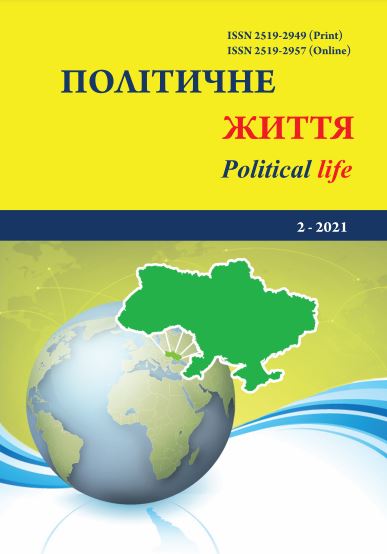Power of information as a factor of innovation thinking style
DOI:
https://doi.org/10.31558/2519-2949.2021.2.17Keywords:
information power; innovative thinking; information society; information culture; cyber culture; virtual reality; communication space; e-democracyAbstract
The essence understanding of the power of information as an innovative style of thinking is analyzed. It has been found that the transition from analog to digital means of information transmission in society is undergoing revolutionary changes, in particular in such areas as politics, law, art, etc.
It is noted that the improvement of sensory and transmitter capabilities of electronic devices, electronic digital coding leads to such a kind of information culture as "synthesizing culture", a characteristic feature of which is the emergence of the so-called total effect of "telesynthesis", the properties of which are instant, multisponsor. Synthesis makes it possible to comprehensively perceive all the "colors" of the information message. At the same time, it generates a synthesized person who will be able to perceive at the same time and holistically all sensual interactions: the image, sound, feeling and strength of the object or object about which the information is provided. This leads to the virtualization of reality, which acquires the independent status of being information as an ideal design. This is a "parallel world" of simulated creative imagination.
It is emphasized that such an information culture detects latent threats: information can turn into power, and it can be abused, manipulated by consciousness. The metamorphoses of power that occur in the information society, risks of political decision-making, risks to mental health are analyzed.
It is summarized that the power of information is of extraordinary importance, because over the years of its existence information has become a factor in the evolution of the entire Civilization. It is the basis of an innovative style of thinking. The rich information nature of knowledge gives it a worldview value, causes "huge changes in our vision of the world, in relation to values and power", causes "gigantic shifts" in the understanding of the social basis, the system of public consciousness.
References
Lanham R. Clicking in: hot Links to a Digital Culture. Seattle, 1993. 230 r.
Heyrman H. Art and Computers: An Exploratory Inverstigation on the Digi-tal Transformation of Art. Santa Cms de Tenerife, 1995. 235 r.
Merleau-Ponti M. Phenomenology of Reception. London, 1989. 224 r.
Heyrman H. Art and Computers: An Exploratory Inverstigation on the Digi-tal Transformation of Art. Santa Cms de Tenerife, 1995. 235 r.
Bekhman H. Kontseptsyy ynformatsyonnoho obshchestva y sotsyalnыe funktsyy ynformatsyy. Ynternet – kultura – эtyka. Moskva-Dubno, 2006. 331 s.
Devys R. Set polytyky: vlyianye Ynterneta na amerykanskuiu polytycheskuiu systemu. Pravo y ynformatyzatsyia obshchestva. Moskvia, 2002. S. 158-164.
Toffler Э. Metamorfozы vlasty. Znanye, bohatstvo y syla na porohe KhKhI veka; per. s anhl. V. V. Belokoskov y dr. / nauch. red., avt. predysl. P. S. Hurevych. Moskva : OOO «AST», 2004. 669 s.
Pruzhynyn B. Y. Novыe ynformatsyonnыe tekhnolohyy y sudbы ratsyonalnosty v sovremennoi kulture: materyalы «kruhloho stola» / B. Y. Pruzhynyn. Voprosы fylosofyy. 2003. № 12. S. 3-8.
Lash S. Critique of Information. London: Sage Publications Ltd., 2002. 234 p.
Pazenok V.S. Informatsiine suspilstvo i kultura. Informatsiine suspilstvo u sotsialno-filosofskii retrospektyvi ta perspektyvi / V. V. Liakh, V. S. Pazenok, Ya. V. Liubyvyi [ta in.]. Kyiv: TOV «XXI stolittia:
dialoh kultur», 2009. 404 s.
Onishchenko A.V. Osoblyvosti lehitymatsii vlady v dobu postmodernizmu. Politolohichnyi visnyk. 2020. Vyp. 84. S. 119-127.
Karpchuk N.P. Stratehichna komunikatsiia YeS yak zasib borotby z dezinformatsiieiu. Politychne zhyttia. 2019. № 1. S.52-58.

